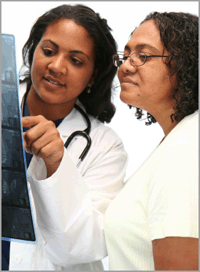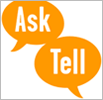Clear Communication: A NIH Health Literacy Initiative
Talking to Your Doctor
Resources from NIH

More and more, today's patients are playing an active role in their health care. Patients and doctors work closely together to achieve the best possible level of health care. An important part of this partnership is clear communication. Asking the right questions-and obtaining quality information about prevention, diagnosis, treatment, and recovery-help ensure safety, prevent errors, and improve health. For example:
- Sharing questions about prescriptions with can prevent taking too much or too little medicine
- Being honest about symptoms can help doctors order the right tests and make the right diagnoses
- Clear instructions after an operation or hospital stay may be the difference between complete recovery or re-injury and relapse
Taking along a family member, friend or caregiver to help you communicate with your doctor can help. So can writing down your questions or concerns in advance of your appointment. NIH offers several publications that can also help promote meaningful interactions between patients and doctors.
How to Talk to your Doctor
- Preparing for Your Doctor Visit, NIH News in Health
- Become a Partner in Your Health Care, NIH News in Health
Cancer
- Communication in Cancer Care, National Cancer Institute (NCI)
- Participating in a Trial: Questions to Ask Your Doctor, National Cancer Institute (NCI)
Eye Health
- Talking
to Your Doctor, National Eye Institute (NEI)
301-496-5248
Hearing
- Your Baby's Hearing and Communicative Development Checklist, National Institute on Deafness and Other Communication Disorders (NIDCD)
Heart Health

- The Heart Truth for Women: Questions to Ask Your Doctor, National Heart, Lung, and Blood Institute (NHLBI)
- The Heart Truth for Women: Questions to Ask Your Doctor (Wallet Card), National Heart, Lung, and Blood Institute (NHLBI)
- Your Guide to a Healthy Heart (PDF - 2.18 MB), National Heart, Lung, and Blood Institute (NHLBI), 301-592-8573
Diabetes
- Five Questions to Ask Your Health Care Team (PDF - 80 KB), National Institute of Diabetes and Digestive and Kidney Diseases (NIDDK)
- Questions to Ask about Your Diabetes Medicines, National Institute of Diabetes and Digestive and Kidney Diseases (NIDDK)
- Kidney Disease of Diabetes: Good Care Makes a Difference, National Institute of Diabetes and Digestive and Kidney Diseases (NIDDK)
Kidney Conditions
- Kidney Dysplasia: Questions to Ask the Doctor, National Institute of Diabetes and Digestive and Kidney Diseases (NIDDK)
Kidney Disease
- Talking
to Your Doctor about Kidney Disease, National Institute
of Diabetes and Digestive and Kidney Diseases (NIDDK)
1-866-4-KIDNEY (1-866-454-3639) or 1-800-891-5390 - Kidney Disease of Diabetes: Good Care Makes a Difference, National Institute of Diabetes and Digestive and Kidney Diseases (NIDDK)
Urologic Conditions
- What I Need to Know about Bladder Control for Women: What your doctor needs to know, National Institute of Diabetes and Digestive and Kidney Diseases (NIDDK)
- What I need to know about Erection Problems: What will happen in the doctor's office, National Institute of Diabetes and Digestive and Kidney Diseases (NIDDK)
- What I Need to Know about My Child's Urinary Tract Infection: What should I ask my child's doctor about UTIs?, National Institute of Diabetes and Digestive and Kidney Diseases (NIDDK)
Weight Loss
- Choosing A Safe and Successful Weight-loss Program, National Institute of Diabetes and Digestive and Kidney Diseases (NIDDK)
Complementary and Alternative Medicine

- Time to Talk: Ask your patients about their use of complementary and alternative medicine, National Center for Complementary and Alternative Medicine (NCCAM)
- Time
to Talk: Tell your health care provider about your use of
complementary and alternative medicine, National
Center for Complementary and Alternative Medicine (NCCAM)
1-888-644-6226
Balance
- Balance,
Dizziness and You, National Institute on Deafness
and Other Communication Disorders (NIDCD)
1-800-241-1044 (voice) or 1-800-241-1055 (TTY)
Aging

- Talking
with Your Doctor: A Guide for Older People, National
Institute on Aging (NIA)
1-800-222-2225

Social Media Links